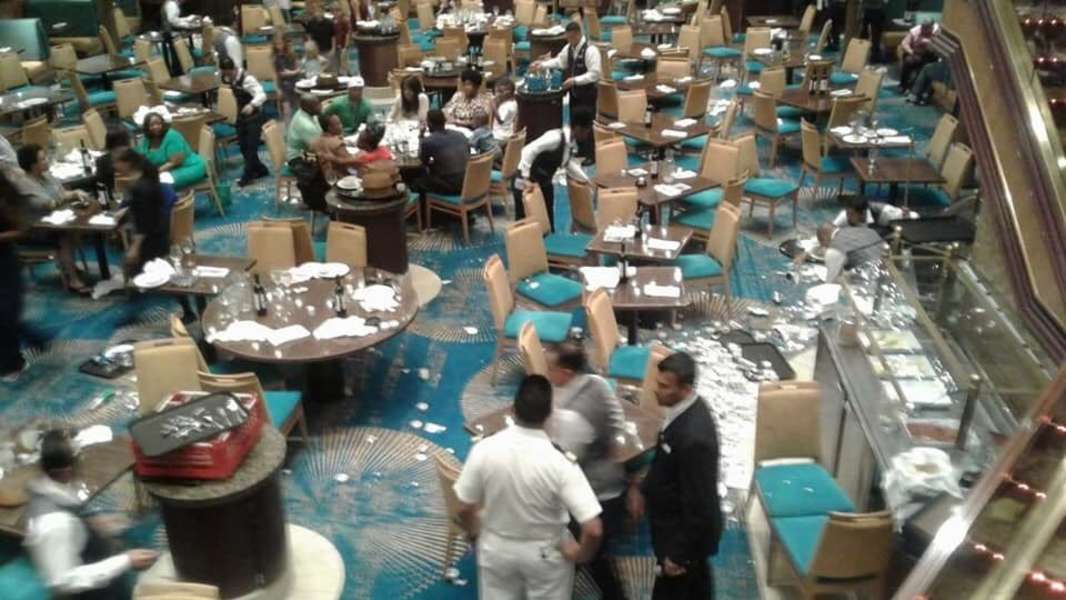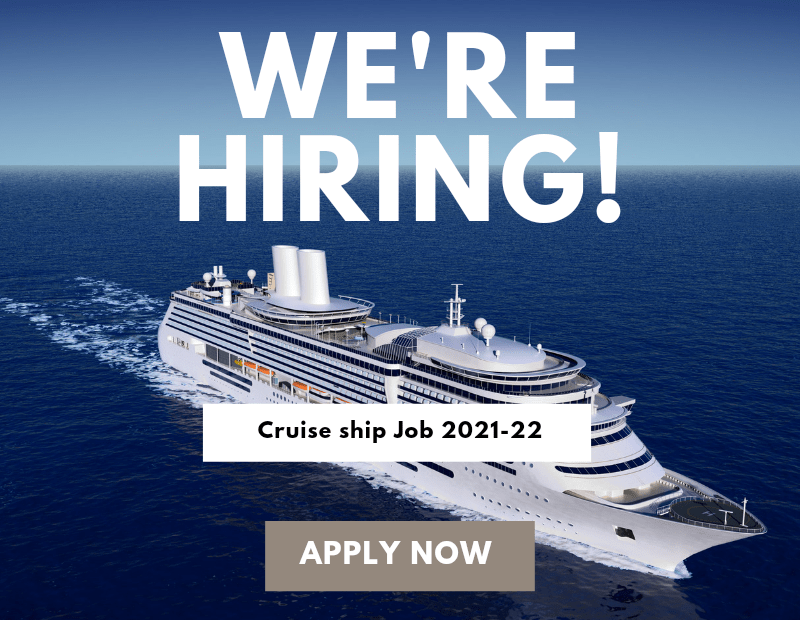
A cruise ship has many different positions. Here's a breakdown of what to expect. This includes the pay, responsibilities and locations of each position. There may be multiple responsibilities and duties for some positions. Many of the most popular positions require a range of duties and responsibilities, such as that of a port lecturer.
Positions
If you are looking for a career in travel, then a cruiseship is a good place to start. You can choose from a variety of jobs, most require certification or a degree. Although many of these positions are either onboard or shore-based they all require extensive hospitality and travel experience.

Responsibilities
The duties of cruise staff include helping passengers book excursions and reservations, as well as providing passenger service. The position also requires communication skills, which will allow them to interact with many different people. In addition to their duties around the ship, staff members may be responsible for ensuring that all guests have a positive experience on board.
Locations
There are many job opportunities on cruise ships. No matter what level of experience you are looking for, there is a job available on any cruise ship. Your passengers' needs will be met and entertained onboard. Some of the jobs on cruise ships include cleaning cabins, washing dishes, and even doing laundry. It's also possible to learn new skills, such as programming computers and learning a language.
Pay
Pay for staff on cruise ships varies depending upon their position and which cruise line they work for. For example, a bartender on a luxury cruise ship can earn as much as $2,200 a month, which includes tips. A cabin steward on a less expensive cruise ship will earn $650 to $1150 per month. Even though they aren't paid much, cruise ship staff work flexible hours and often have long schedules.

Social life
Crewmembers on cruise ships often have close knit social networks that are based on their nationality or other shared interests. Some cruise crew members can form strong friendships that last a lifetime, while others have trouble separating themselves from the group. Crew members of cruise ships love to laugh and share their successes with one another.
FAQ
Why are cruise vacations popular?
Cruises have become increasingly popular because they offer an exciting vacation experience for people who want to travel but don't want to deal with airport delays and long flights. The cruises offer a relaxed atmosphere that allows passengers to relax and enjoy their vacation without having to worry about work or other daily details.
Also, cruise ships make it easy to visit different locations on land or at sea. They have plenty of time to explore all the attractions and sights in each destination.
Which type of cabin should I choose?
When deciding on a cabin, think about what size room you want. Are you okay sharing a bath with another person? Or would you prefer to have your own bathroom? Do you find noise essential? Do you prefer to spend your time in the dining room or in your stateroom? Also, think about whether you want a balcony or an interior view. Balconies are a bit more spacious, but can sometimes be loud. Interior views are generally quieter than balconies.
Is there anything else I should know before going on a cruise?
Before you go on your first cruise, there are many things that you should know. Remember that you will travel with other people. Avoid being overly critical of these people because you never know how they feel about something. Also, remember that you will be eating and drinking with strangers. Wear appropriate clothing. You should not wear tank tops or shorts on deck. Wear comfortable clothing that you won't have to worry about getting dirty. Keep yourself ready for extreme temperatures. Be sure to pack lots of sunscreens. Bring a hat, sunglasses, and a light jacket just in case you have to spend some time outside. Last but not least, be responsible for your actions. Don't drink-drive!
What is the average cost of a cruise vacation in Canada?
The average cruise vacation cost is $1,000 per person, plus taxes and fees. A family of four will pay $4,200 on average. This includes meals, beverages, entertainment, activities and gratuities as well as all meals.
Do I need to tip my Cruise Director?
This is dependent on the cruise line. Some cruise directors are paid tips while others receive no tipping. When you board the cruise ship, ask your Cruise Director if they need tips. They will often tell you if tips are expected.
Which place should I take on my cruise vacation?
You can choose to travel to different ports of calling if this is something you are interested. These details can also be used to help you narrow down your search. For example, if history is your passion, you may choose to cruise to destinations such as Alaska, Bermuda or Canada. You may be more interested in water sports and beaches, so you might consider a trip that includes destinations such Jamaica, Aruba. Bahamas, Costa Rica. Panama. Hawaii.
Statistics
- In addition, 10 to 15 percent gratuity is typically added to bar bills — for alcohol and soft drinks — and gratuities are applied to spa treatments. (cruiseline.com)
- The line estimates savings of 50% when you purchase this bundle. (travel.usnews.com)
- *20% Gratuities Apply on Free Unlimited Open Bar; Free Specialty Dining. (ncl.com)
- You'll need to budget around $80 per person per day for this option – and an additional 18% gratuity. (travel.usnews.com)
External Links
How To
How to stay safe while on a cruise ship
Before you embark on your cruise, there are many things that you need to know. Behave properly onboard to avoid any problems. These safety tips will make your trip more enjoyable.
-
Always be aware of what is happening around you. People are more likely to be together when they're eating on a cruise ship than anywhere else. Because you are surrounded with people who want to talk and eat, it is easy to get distracted from your tasks. You shouldn't allow this to distract you away from the important things you need to do. If you notice someone engaging in dangerous behavior, such as smoking, or drinking alcohol, politely tell them to stop.
-
Always keep your room key close to you when you board the ship, and hand over your room key to the person checking you in. If you get lost or need to be found, this will help you to locate your shipmates. Also, make sure to have your passport.
-
Keep valuables out-of-reach Most cabins are equipped with drawers beneath the bed. This is a great place for valuables like passports, credit cards, or money. Make sure that nothing valuable is visible from plain sight. Put your bags away in the closet so no one can see them.
-
Keep hydrated. Although cruise ships offer plenty of water, it can be difficult to remember to drink enough. Take advantage of the free bottled water available throughout the ship. Keep yourself hydrated. Dehydration makes you tired and cranky, leading to fights or accidents.
-
Pay attention to the announcements. Announcements are displayed everywhere, including on TV screens. They include safety procedures as well emergency exits and even weather reports. Pay attention to these announcements. They may save your life.
-
Never leave your cabin unlocked. Never leave your cabin unlocked, no matter how friendly a crew member seems. Thieves are known to break in through doors that are not locked. A crew member can grant permission to use the restroom.
-
Avoid going alone overboard. If you fall overboard, it takes time for the ship's crew to rescue you. Your body may be attracted by sharks and other sea creatures. It is best to wait for help.
-
It is forbidden to smoke in the elevator. These elevators are pressurized, meaning smoke can build up quickly. If you feel dizzy or lightheaded, get off immediately. Although the air outside may be fresh, that doesn't mean your breathing is safe.
-
Be familiar with the evacuation procedures. Every year, many people die in elevators. If an emergency occurs, follow the instructions on the screen.
-
Make sure you are familiar with the fire drill. Fire drills take place regularly, almost every day. Everyone on deck needs to evacuate during a drill. Follow the directions given by the crew members. Once the drill is complete, go back to your cabin and lock the door.
-
Ask questions before you accept food and drinks. Cruisers are often concerned about food poisoning. People don't know that certain foods are not safe to be eaten while aboard a ship. Most cruise ships prohibit raw oysters. If you're unsure whether or not the food you've been offered is safe, politely refuse and look for another meal instead.
-
Be careful when using the pool. Many passengers have accidentally fallen into the pool. It is possible to slip and fall into the pool without being noticed. It is possible to slip and tumble on the deck at any given moment. You should always wear good footwear and be aware of your surroundings.